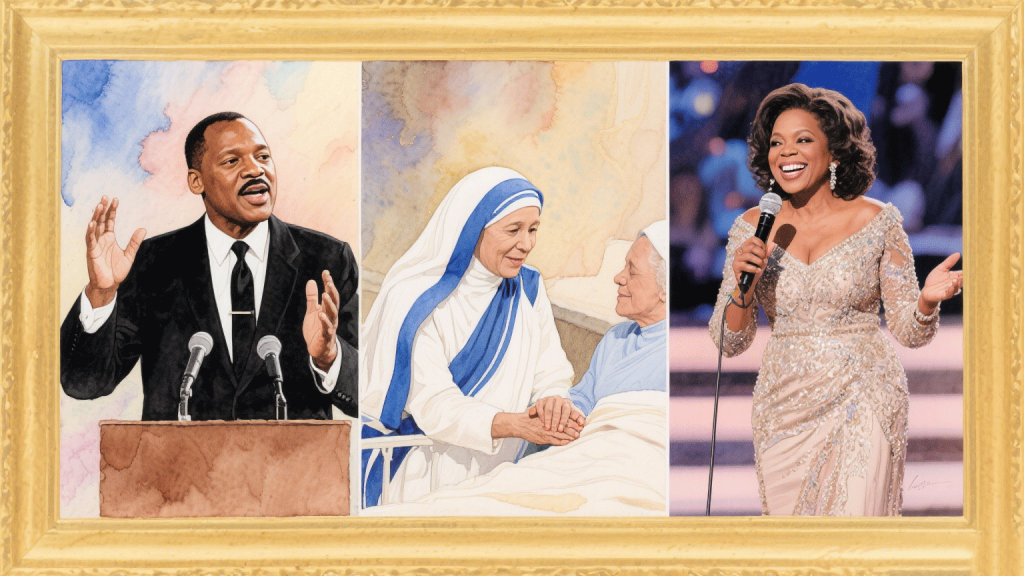ENFJs are best suited for careers that require leadership, interpersonal interaction, and helping others grow, including: 1. Educators/Trainers; 2. Psychological Counselors/Life Coaches; 3. Human Resources Managers; 4. Nonprofit Organization Leaders; 5. Public Relations/Marketing Experts. They are born with the ability to inspire others, and they perform particularly well in positions that require teamwork and visionary leadership.
ENFJ has three core advantages in interpersonal relationships: 1. Excellent communication skills, can accurately understand the needs of others; 2. Natural supporters, always see the potential of others; 3. Strong sense of responsibility, will take the initiative to maintain harmonious relationships. They are called "teaching" personalities, good at helping partners and friends grow, and are excellent life mentors and emotional supporters.
The main sources of stress for ENFJs are: 1. Over-taking on other people's emotions, leading to emotional exhaustion; 2. Feeling anxious when conflicts arise in a team or relationship; 3. Not being recognized for their efforts; 4. Being forced to compromise on values. It is recommended that ENFJs learn to set boundaries, recharge themselves regularly in solitude, and accept the fact that "not everyone needs to be saved."

Making up just 2% of the global population, they possess the passion and capability to change the world.
Known as the “Protagonist” or “Teacher” type in the MBTI framework, ENFJ is one of the most charismatic and empathetic personality types. The ENFJ profile is defined by four core dimensions: Extraversion (E), Intuition (N), Feeling (F), and Judging (J). This unique combination grants them extraordinary abilities to inspire others, perceive needs, and organize groups.
As one of the rarer types, ENFJs comprise only 2.2% of the global population (2.8% female, 1.4% male). Renowned for their idealism, enthusiasm, and organizational skills, they often become catalysts for social change and facilitators of others’ growth.
The Four Dimensions of ENFJ: Understanding the Core Structure
To deeply understand the ENFJ personality, we must examine its four foundational dimensions:
Extraverted (E): ENFJs gain energy through social interaction. They are natural socializers who connect effortlessly with diverse groups. In team settings, they often naturally assume leadership roles, radiating a unique magnetism.
Intuitive (N): ENFJs possess broad vision and forward-thinking minds, focusing on possibilities rather than minute details. They are fascinated by new knowledge and abstract concepts, excelling at connecting seemingly unrelated ideas to form innovative solutions.
Feeling (F): ENFJs make decisions based on values and emotional considerations. They prioritize harmony and relationships, perceptively sensing others’ emotions and using this insight to guide their actions. A strong moral compass drives them to advocate for fairness and justice.
Judging (J): ENFJs prefer structure and planning. They are skilled organizers and decisive decision-makers. When faced with choices, they can make prompt decisions and ensure effective execution, making them highly efficient project leaders and coordinators.
ENFJ Core Traits: Strengths and Shadow Sides
Strengths
ENFJs possess an impressive array of natural talents:
Exceptional Communication Skills: ENFJs communicate effortlessly across diverse mediums. Whether lecturing in a classroom or writing a heartfelt letter, they excel at transforming ideas into compelling language. They express themselves naturally in both large and small groups, enjoying the spotlight while inspiring their audience.
Innate Charismatic Leadership: ENFJs maintain strong social networks, frequently organizing events and creating opportunities for connection. Their leadership ensures others readily participate with enthusiasm. Teaching and mentoring feel as natural as breathing, making them exceptionally suited for leadership, training, or educational roles.
Deep Empathy: ENFJs possess an intuitive ability to sense others’ emotions, often serving as an emotional barometer for those around them. Their compassion extends beyond close relationships; they are fundamentally humanitarian, holding genuine concern for humanity’s collective struggles.
Persuasive Effectiveness: ENFJs are renowned for their persuasive power, often successfully encouraging others to take desired actions. Their motivations are altruistic rather than manipulative or self-serving; they genuinely want people to improve. Being highly likable and trustworthy, others are usually receptive to their influence.
Potential Challenges
Even the most charismatic ENFJs face unique struggles:
Focusing Excessively on Others While Neglecting Self: ENFJs may prioritize others’ needs and emotions excessively, leading to suppressed personal needs. They might sacrifice their own time and energy for others, ultimately risking burnout.
Overdeveloped Responsibility and Emotional Fatigue: ENFJs often feel an intense responsibility for others, taking on excessive burdens and pressure. Frustration and guilt can arise when they realize they can’t meet everyone’s expectations. Constantly absorbing others’ emotions makes them prone to emotional exhaustion.
Oversensitivity to Criticism: Valuing others’ feelings deeply, ENFJs tend to be highly sensitive to criticism and negative feedback. They may interpret criticism as a rejection of their core worth, leading to shaken confidence.
Overlooking Details in Decision-Making: Driven by passion and spontaneity, ENFJs might dive into projects without fully examining problems or considering consequences. When their intuitive gifts dominate, they may believe they see the big picture while overlooking crucial details.
Table: Contrasting ENFJ Core Strengths and Challenges
| Strengths | Challenges | Impact Area |
|---|---|---|
| Leadership Charisma & Organization | Overdeveloped Responsibility | Prone to excessive responsibility leading to high stress |
| Deep Empathy & Understanding | Emotional Fatigue | Risk of depletion from absorbing others’ emotions long-term |
| Visionary Thinking & Innovation | Detail Oversight | Potential to miss critical implementation details |
| Harmony Cultivation Ability | Conflict Avoidance | May suppress genuine needs to maintain surface harmony |
World-Renowned ENFJ Figures
Many eminent leaders and changemakers throughout history embody the ENFJ personality:
Martin Luther King Jr.: This American civil rights leader is a quintessential ENFJ. Championing racial equality and free speech, he motivated millions to join social movements through his powerful oratory and personal charisma.
Mother Teresa: Recognized as one of the “most compassionate women,” her lifelong service to the marginalized exemplified the ENFJ’s altruistic spirit and profound empathy.
Oprah Winfrey: From talk show queen to media empire builder, Oprah showcases the ENFJ’s capacity to inspire. Her authentic communication and deep social consciousness have impacted millions globally.
Barack Obama: The former US President demonstrates classic ENFJ traits – visionary leadership, powerful communication focused on unity and hope, and a deep commitment to social progress.
ENFJ in Social Dynamics & Relationships: The Pursuit of Deep Connection
ENFJs in Romantic Relationships
In love, ENFJs are passionate partners who invest wholeheartedly, striving to meet their partner’s needs. A relationship between two ENFJs can foster deep understanding but may also suppress authentic feelings due to an excessive focus on harmony.
ENFJs need to learn to balance giving and receiving, preventing relationship imbalances caused by one-sided effort. They should also practice expressing their own needs directly rather than assuming their partner will intuit them.
Friendship Patterns
ENFJs are loyal and supportive friends, adept at creating warm, inclusive social atmospheres. As friends, they are excellent listeners providing emotional support, often acting as the “social glue” within their circles.
However, ENFJs should guard against over-involvement in friends’ problems, learning to set healthy boundaries to avoid exhaustion from absorbing others’ emotions.
Family Role
As parents, ENFJs create nurturing, warm family environments. Demonstrating a deep understanding of their children’s emotional needs, they strive to make every family member feel loved, valued, and understood.
The challenge lies in balancing emotional support with fostering independence. ENFJ parents may struggle with setting consistent boundaries or enforcing discipline, often prioritizing harmony and avoiding conflict.
ENFJ in the Workplace: Illuminating Others’ Potential
Ideal Career Paths
ENFJs thrive in people-centric roles where they can leverage their inspirational abilities:
Education: As K-12 teachers, university counselors, or corporate trainers, ENFJs fulfill their natural gift for fostering growth. Education satisfies their need to impart values and build team cohesion.
Counseling & Therapy: Roles like marriage/family therapists or career counselors fully utilize the ENFJ’s high empathy. They help resolve psychological challenges through active listening and positive guidance.
Human Resources & Management: Positions such as HR Business Partners or Employee Relations Specialists benefit from ENFJ organizational and coordination talents. They demonstrate approachability during recruitment and training, driving organizational culture.
Public Relations & Communications: Roles in brand PR or community engagement suit the ENFJ’s social creativity. Their infectious enthusiasm effectively boosts participation in public initiatives or client retention programs.
Non-Profit & Social Services: Project directors for foundations or community center managers align with the ENFJ’s social mission. They drive impactful initiatives through resource mobilization, achieving personal and societal value alignment.
Workplace Performance & Challenges
Within teams, ENFJs are collaborative, inspiring members, committed to implementing collective improvements. They excel at understanding others’ needs and priorities, adept at building consensus.
As leaders, ENFJs are enthusiastic, helpful, and action-oriented, possessing clear visions for enhancing organizations to better serve people. They seek collaboration, desiring others’ active participation in both action and spirit, often serving as mentors.
However, in persistently conflictual environments, ENFJs can become discouraged. They deeply need appreciation; if unable to gain support for their ideas and values, they may feel drained and ineffective.
ENFJ Compatibility: Finding Optimal Partners
Highly Compatible Types
According to Jungian cognitive function theory, ENFJs form particularly complementary relationships with certain types:
INFP: Often considered the ENFJ’s “ideal match.” The INFP’s dominant Introverted Feeling (Fi) complements the ENFJ’s inferior function, Introverted Thinking (Ti), while the ENFJ’s dominant Extroverted Feeling (Fe) supports the INFP’s inferior function, Extroverted Thinking (Te). This creates profound emotional understanding and balance.
INTP: The INTP’s rational analysis powerfully complements the ENFJ’s emotional intelligence. INTPs help ENFJs strengthen objective decision-making, while ENFJs help INTPs develop emotional expression and interpersonal skills.
Dual ENFJ Relationships
A relationship between two ENFJs fosters deep connection and harmony. Their shared dominant Extroverted Feeling (Fe) function allows profound mutual understanding of emotional needs, creating a supportive, harmonious atmosphere.
However, this pairing risks repressing conflict due to excessive harmony-seeking, potentially allowing issues to fester. Both partners need to learn direct communication skills and courageously address necessary conflicts.
Potentially Challenging Combinations
While any type can build successful relationships, ENFJs pairing with highly logic-driven types who may neglect emotional needs (e.g., some Thinking-dominant personalities) might encounter more friction. These combinations require extra mutual effort to understand differences.
The ENFJ Growth Journey: Balancing Giving and Self-Care
Establishing Healthy Boundaries
One of the ENFJ’s greatest challenges is balancing caring for others with self-care. Setting clear boundaries is not selfish but essential for sustainable contribution. ENFJs must practice assessing their own resources and energy before saying “yes.”
Embracing Imperfection
ENFJs need to recognize that conflict and imperfection are natural parts of relationships. Growth often occurs in spaces of tension. Consciously facing and processing conflict can deepen connections.
Enhancing Decision-Making Skills
When making important decisions, ENFJs should actively gather objective data and facts to balance emotional considerations. Seeking input from Thinking-type colleagues or friends can broaden perspective.
Practicing Self-Care
ENFJs should schedule regular “recharging time” for solitary, restorative activities. Mindfulness meditation, journaling, or creative expression are effective ways to process accumulated emotions.
Celebrating Personal Achievements
ENFJs often focus so intently on others’ success that they neglect their own accomplishments. Consciously acknowledging and celebrating personal milestones is vital for maintaining healthy self-worth.
ENFJs are the idealistic organizers, driven to realize visions that best serve humanity.
With their unique blend of warmth and resolve, ENFJs serve as catalysts for social change and supporters of others’ growth. By learning to balance giving and receiving, and caring for others while nurturing themselves, they can sustain their passion and influence without burning out.
The world needs the idealism, enthusiasm, and leadership of ENFJs. If you are part of this rare “Protagonist” type, cherish your gifts while also treating your own needs gently. Your presence makes the world warmer, more just, and full of possibility.
For more MBTI personality type analyses, visit our dedicated page. Content herein is for reference; personality typing is a tool for self-understanding, not a rigid framework.






